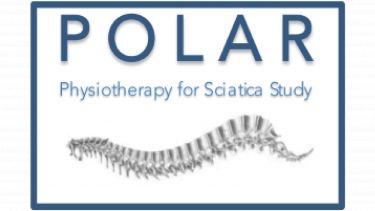POLAR research study
Physiotherapy for sciatica - is earlier better?
Context and challenges
Sciatica is the name used for the condition where you can experience pain, pins and needles, numbness and/or weakness in one or both legs. Sciatica often lasts only a few months but can last a lifetime.
What causes it?
Sciatica is caused by nerves in the lower back being squashed or irritated. The most common cause of the compression is a disc prolapse in the lower back.
How does this affect people?
Some people have terrible pain and difficulties with everyday living, including work, hobbies and life. Other people have no problems whatsoever.
Treatment - surgery or physiotherapy?
Surgery helps people get better quicker than physiotherapy but research has shown that people who have either surgery or physiotherapy have the same results at about a year after. Surgery has some risks associated with it that physiotherapy doesn't.
When should treatment start?
We know early treatment for back pain is better than delayed treatment but this hasn't been studied in people with sciatica. It seems logical that if you treat the problem early then this would be better, but it may be that it gets better on its own.
The current problem
We don't know if having physiotherapy early after sciatica starts is better than waiting for a few weeks or months before starting treatment.
The solution?
The study aims to recruit 80 patients with sciatica who will be split into two groups. Both groups will receive up to six sessions of physiotherapy, one group within two weeks of seeing their doctor and the other group will wait for six weeks before receiving their treatment.
- Patient sees their GP with sciatica
- Invited and agrees to take part in the study
- 40 patients have physiotherapy at two weeks after GP referral
- 40 patients have physiotherapy at six weeks after GP referral
- 3 x 12 week blocks of recruiting and treating patients
- Interviews with patients, physios, GPS and other people involved in the study
- Three cycles of refinements made to the study following review of the results of interviews
- Results
Treatment
Treatment is based on the individuals goal, guided by these 7 areas:
- Nerve health
- Fitness and strength
- Back stiffness
- Pain
- Controlling movement
- Understanding the problem
- Psychological health problems
Targeted physiotherapy will be individually tailored to meet the goals of the participant.
The study is being led by Michael Reddington, NIHR Clinical Doctoral Research Fellow and Spinal Extended Scope Physiotherapist at Sheffield Teaching Hospitals NHS Foundation Trust. It is as part of an NIHR Clinical Doctoral Research Fellowship awarded to Mr Reddington.
Study contact details
| Name | Role | Contact Number | |
|---|---|---|---|
| Michael Reddington | Chief Investigator | mreddington1@sheffield.ac.uk | +44 7511 283778 |
| Mark Pinkerton | Research Nurse | mark.pinkerton@nihr.ac.uk | +44 7831 176159 |

